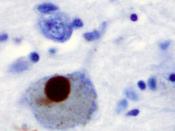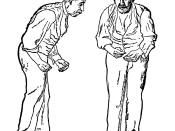In the movie Awakenings, a psychiatrist takes an interest in the patients that are in a statue-esque state. After much research and experimentation, he concludes that the patients were misdiagnosed, and actually have a severe case of Parkinson's disease. Parkinson's disease is a progressive nervous disease associated with the destruction of brain cells that produce dopamine and characterized by muscular tremor, slowing of movement, partial facial paralysis, peculiarity of gait and posture, and weakness. His experimental treatment included the new drug Dopamine, which is an antagonist in the brain, blocks the transmissions, and thereby limiting it, and increases Copamine in the synaptic gap.
When the patients "awoke", they almost acted as an adult newborn. Every little detail that we took for granted, such as electricity, the views of the city streets, and even simple decision making and freedoms, they were entranced and obsessed with. It was difficult for some of the treated patients to cope with the realization that they have been "asleep" for 30 some years, time must have been warped if they didn't realize they were gone for so long.
He only problem with the treatment was that most of the patients relapsed. The drug couldn't maintain the charge needed, and therefore exited the system.
One reviewer of the movie said "we have forgotten what matters - friendship, family, and the simplest things." After watching the movie, and seeing the reactions and the feelings of the patients, it really shows how much we overlook. These patients were overwhelmed that they could speak and walk. One patient requests to go for a walk, the doctors don't understand why because they do it all the time, but as he explains, he hasn't been able to make simple decisions as to going right, left or straight, talking to people,


